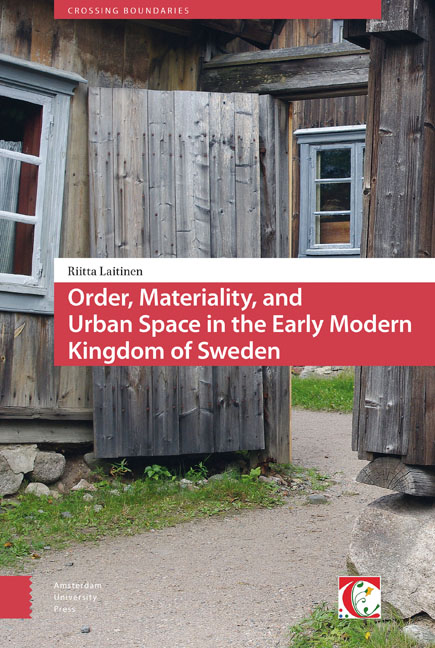Book contents
Summary
Everything is in order. That is, things are always in order, inasmuch as they are in a certain relation to each other and their surroundings. But the idea of order and ideal order are culturally and historically variable. Similarly, disorder is always cultural. This book explores how things were ‘in order’ in seventeenth-century Swedish/Finnish urban space.
Order is considered to have had an important role in European early modern cultures, more so than in the periods before and after. Early modern order was hierarchical and patriarchal. Thomas Robisheaux's list of the social values of order is descriptive: Hierarchy, social harmony, religious unity, corporate solidarity, the common good, deference, and obedience are visible in many early modern sources as well as in numerous scholarly treatises on early modern society and culture. A consensus exists that the early modern world was a world of patriarchal relations; a world of Gute Policey and administrative and policing reforms; and a world where people and things were expected to be in their correct and appropriate place. At the same time, scholars acknowledge that early modern order was multifaceted, complex and multi-layered; different meanings of order, various practices related to it, and the diverse agents involved in creating and maintaining order have been studied in recent decades. Studies of male interpersonal violence and the order of disorderly nightlife have highlighted how order was never merely something imposed from above. Research on the place of various categories of women and the lives lived in early modern households has diversified our understanding of hierarchical and patriarchal order in early modern Europe. The politics and policies imbued with hierarchical order have been seen more openly, for example, in studies of grass-root political practices and in the arrangement of church pews. Research on the emerging arrangement of poor relief and other urban administration has highlighted the impact of early modern understandings of order in everyday life, even when focusing on administration and legislation. These studies have shown how early modern order was diverse, albeit patriarchal and hierarchical, and that it was produced by ordinary people as much as by the authorities.
- Type
- Chapter
- Information
- Publisher: Amsterdam University PressPrint publication year: 2017



